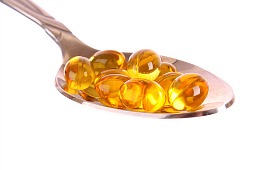Guide to Mercury in Fish Oils

If you’re considering taking fish oil, you may be wondering if there’s any risk for mercury exposure.
Fish and fish oils are an excellent source of the omega 3 fatty acids, eicosapentaenoic acid (EPA) and docosahexaenoic acid (DHA). These fatty acids have been shown to help prevent or reduce your risk for heart disease.
The problem with eating fish is it may contain high levels of mercury, called methylmercury.
Methylmercury is toxic and is absorbed into the fish from the water they swim in. Fish can also consume mercury from eating other fish.
Using fish oils, rather than eating fish, is one way you can avoid mercury exposure – as long as the products that have been tested and analyzed by third-party laboratories.
How to Check for Mercury Levels in Fish Oils

mercury droplets
The only way you can determine the mercury level in any fish oil product is to have it analyzed by a certified laboratory.
The global fish industry may be monitored and regulated by many different regional, national and international agencies and/or organizations.
Each country or organization may have their own criteria for what they deem acceptable or unacceptable levels of mercury in fish oils.
Fortunately, many fish oil manufacturers will hire third-party laboratories to analyze their fish oil products for mercury and other contaminants.
In North American, one of the most popular companies that analyzes and certifies fish oils is the International Fish Oil Standards (IFOS).
The IFOS is an independent lab that routinely tests a variety of fish oil supplements.

IFOS Certified Label for Fish Oil
The IFOS follow strict standards set forth by the World Health Organization (WHO) and the Council of Responsible Nutrition.
The majority of the fish oils tested are submitted by companies that wish to have their oils tested.
The fish oil companies must pay a fee for this service and the test results are published on the IFOS website for consumers to see.
However, not all fish oils products tested for mercury may follow the same standards as other laboratories.
Some fish oil products will meet the bare minimum standards for mercury and contaminants, whereas other fish oil companies may strive for extremely strict controls.
It’s recommended you research the company behind the product you’re interested in buying.
Doing your due diligence will help you find a high quality product to help you avoid any traces of mercury in fish oils.
Research References:
Mercury in fish oils, and the risk of myocardial infarction. New England Journal of Medicine 2002;347:1747–1754. Guallar E, Sanz-Gallardo MI, van’t Veer P. et al.
Blood mercury levels in US children and women of childbearing age 1999–2000. JAMA 2003;289:1667–1674. Schober SE, Sinks TH, Jones RL. et al.
Measurement of Mercury Levels in Concentrated Over-the-Counter Fish Oil Preparations: Is Fish Oil Healthier Than Fish? Archives of Pathology and Laboratory Medicine: Vol. 127, No. 12. S. Foran, J. Flood, K. Lewandrowski
Mercury and fish oil supplements. MedGenMed 2001;3:20 Schaller JL
Intake of mercury from fish, lipid peroxidation, and the risk of myocardial infarction and coronary, cardiovascular, and any death in eastern Finnish men. Circulation 1995;91:645–655. Salonen JT, Seppanen K, Nyyssonen K. et al.
Home Page > Fish Oil Home Page > Mercury in Fish Oils





